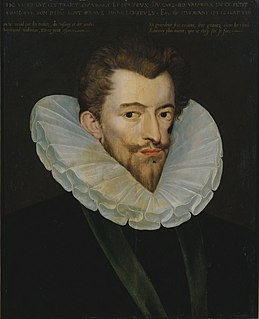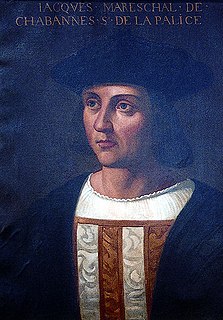 W
WThe Grand Master of France was, during the Ancien Régime and Bourbon Restoration in France, one of the Great Officers of the Crown of France and head of the "Maison du Roi", the king's royal household. The position is similar to that of Lord Steward in England.
 W
WCharles d'Amboise, Seigneur de Chaumont was a French nobleman, who acted as French governor of Milan (1503–1511) during the reign of Louis XII and as a French commander during the War of the League of Cambrai.
 W
WArmand de Bourbon, Prince of Conti, was a French nobleman, the younger son of Henri II, Prince of Condé and Charlotte Marguerite de Montmorency, daughter of Henri I, Duke of Montmorency. He was the brother of le Grand Condé and Anne Geneviève, Duchess of Longueville. As a member of the reigning House of Bourbon, he was a Prince du Sang.
 W
WCharles de Bourbon was a French prince du sang and military commander during the struggles over religion and the throne in late 16th century France. A first cousin of King Henry IV of France, he was the son of the Huguenot leader Louis I de Bourbon, prince de Condé and his second wife, Françoise d'Orléans-Longueville. He gave his name to the Hôtel de Soissons after his title Count of Soissons.
 W
WHenri Jules de Bourbon was prince de Condé, from 1686 to his death. At the end of his life he suffered from clinical lycanthropy and was considered insane.
 W
WHenri II de Bourbon, Prince of Condé was the head of the senior-most cadet branch of the House of Bourbon for nearly all his life and heir presumptive to the king of France for the first few years of his life. Henri was the father of Louis, le Grand Condé, the celebrated French general.
 W
WLouis de Bourbon, or Louis III, Prince of Condé, was a prince du sang as a member of the reigning House of Bourbon at the French court of Louis XIV. Styled as the Duke of Bourbon from birth, he succeeded his father as Prince of Condé in 1709; however, he was still known by the ducal title. He was prince for less than a year.
 W
WLouis Joseph de Bourbon was Prince of Condé from 1740 to his death. A member of the House of Bourbon, he held the prestigious rank of Prince du Sang.
 W
WAntoine I de Croÿ, Seigneur de Croÿ, Renty and Le Roeulx, Count of Porcéan, was a member of the House of Croÿ.
 W
WCharles de Lorraine, 4th Duke of Guise and 3rd Prince of Joinville, was the son of Henry I, Duke of Guise and Catherine of Cleves, and succeeded his father as Duke of Guise in 1588. Initially part of the Catholic league, he pledged his support for Henry IV of France and was made Admiral of the Levant by Louis XIII of France. After siding with the Queen Mother, Marie de' Medici, against Cardinal Richelieu, he fled to Italy with his family where he died in 1640.
 W
WFrancis de Lorraine II, the first Prince of Joinville, also Duke of Guise and Duke of Aumale, was a French general and politician. A prominent leader during the Italian War of 1551–1559 and French Wars of Religion, he was assassinated during the siege of Orleans in 1563.
 W
WHenry I, Prince of Joinville, Duke of Guise, Count of Eu, sometimes called Le Balafré (Scarface), was the eldest son of Francis, Duke of Guise, and Anna d'Este. His maternal grandparents were Ercole II d'Este, Duke of Ferrara, and Renée of France. Through his maternal grandfather, he was a descendant of Lucrezia Borgia and Pope Alexander VI.
 W
WLouis VII, called the Bearded was the Duke of Bavaria-Ingolstadt from 1413 until 1443. He was a son of Duke Stephen III and Taddea Visconti.
 W
WLouis Henri, Duke of Bourbon, or Louis Henri I, Prince of Condé, was head of the Bourbon-Condé cadet branch of the France's reigning House of Bourbon from 1710 to his death, and served as prime minister to his kinsman Louis XV from 1723 to 1726. Despite succeeding as head of the House of Condé in 1709 as Prince of Condé, he never used that name, preferring the title Duke of Bourbon, and was known at court as Monsieur le Duc. As a member of the reigning House of Bourbon, he was a prince du sang.
 W
WLouis de Bourbon, Prince of Condé, known as the Great Condé for his military exploits, was a French general and the most illustrious representative of the Condé branch of the House of Bourbon. He was one of Louis XIV's most pre-eminent generals. Condé is particularly celebrated for his triumphs in the Thirty Years' War, notably at Rocroi, and his campaigns against the Grand Alliance in the Franco-Dutch War. He also rebelled against Louis XIV as the leader of the last Fronde in 1651, leading to his exile from France until 1659.
 W
WLouis de Bourbon, Comte de Soissons, May 1604 – 6 July 1641, was the son of Charles de Bourbon, Count of Soissons and Anne de Montafié. A second cousin of Louis XIII of France he was a prince du Sang, those considered part of the Royal family. Part of the faction who opposed Cardinal Richelieu and his policy of war with Spain, he was killed leading a revolt at the Battle of La Marfée in 1641.
 W
WAnne, Duke of Montmorency, Honorary Knight of the Garter was a French soldier, statesman and diplomat. He became Marshal of France and Constable of France and served five kings.
 W
WFrançois de Montmorency, Duc de Montmorency was a French soldier, diplomat and peer who served as governor of Paris. He was Duke of Montmorency, Count of Dammartin, Baron of Châteaubriant and Lord of L'Isle-Adam, Grand Master of France, and Marshal of France.
 W
WJacques de La Palice was a French nobleman and military officer. His full name and titles were Jacques II de Chabannes, Lord of La Palice, of Pacy, of Chauverothe, of Bort-le-Comte and of Héron. In 1511, he received the title of Grand Master of France.
 W
WPhilip II, surnamed the Landless, was the Duke of Savoy for a brief reign from 1496 to 1497.
 W
WTanneguy III du Châtel was a Breton knight who fought in the Armagnac–Burgundian Civil War and the Hundred Years' War. A member of the Armagnac party, he became a leading adviser of King Charles VII of France, and was one of the murderers of Duke John the Fearless of Burgundy in 1419.
 W
WThomas Francis of Savoy, 1st Prince of Carignano was an Italian military commander and the founder of the Carignano branch of the House of Savoy, which reigned as kings of Sardinia from 1831 to 1861, and as kings of Italy from 1861 until the dynasty's deposition in 1946.